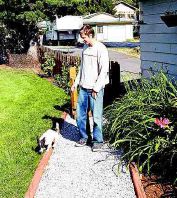|
Before
looking, define needs
|

|
FINDING
COMFORT, NOT COMPROMISE: Greg deVeer
(pictured) and Kelsie
Wheeler balanced their "wish list" — specific
criteria their dream house would embody — with a
realistic sense of what they could get.
PHOTO BY
DON CLARK
|
By
Stacee Sledge, for The Bellingham Herald
One
of the most important factors in buying a home is choosing the
neighborhood that suits you best. It’s vital that you find an
area that matches your lifestyle — as well as your bank
statement.
It
took research to find the right spot. Know what you need and
want in a house, and how much you can afford to spend.
When
Greg deVeer
and Kelsie Wheeler began to look for their first home two years
ago, they had specific criteria in mind.
They
wanted grocery stores and parks nearby, as well as close
proximity to friends’ homes.
Easy
freeway access was also high on their list, although they knew
an area as traffic-choked as Sunset wasn’t going to fit the
bill.
And
perhaps most importantly, they wanted a safe area where homes
had been well-maintained by homeowners who took obvious pride in
their surroundings.
After
three months spent finding houses they liked in neighborhoods
they didn’t, “we realized we were going to have to sacrifice
something to get what we wanted,” says Greg.
They
found the ideal house in Fairhaven, a cozy bungalow with the architectural details they desired.
Its only drawback? It was surrounded by apartments, rather than
other single-family homes.
By
balancing their wish-list with reality, Greg and Kelsie decided
the possibility of occasional neighborly noise wasn’t
something that would bother them. The positives far outweighed
the potential negatives.
They’ve
lived in this house that has proven perfect for them and their
plethora of pets for two years now. “We weren’t especially
looking for homes in Fairhaven,” admitted Greg, “but now that I live here, I’m glad I
do.”
“We
got everything we wanted: a cute house, big garage, double lot,
and a good price — but it’s surrounded by apartments. If it
weren’t, that would have been great, but it would have been
out of our price range.”
Before
you narrow down your neighborhood aims, jot down your thoughts
about what you want and need in your surroundings.
Do
you want an urban or suburban feel? How important is commute
time to you? Is it important to be able to walk to your favorite
coffee shop, movie theatre, or grocery store? Is a bus line
readily accessible? Will your children have playmates their age
nearby?
Once
you have an idea of what’s important to you, you’re ready to
move on to the research process.
Begin
with statistics. Log on to the Internet or check with your local
library to check crime statistics in all the neighborhoods you
think you’d like to live in. Bellingham is fortunate, as even the few neighborhoods described as having
above average crime rates are reasonably safe.
You’ll
also want to examine demographic and lifestyle data. Good
schools are an indicator of a healthy community and can affect
your property’s resale value. Your real estate agent will also
be able to provide details on the different schools in our
community.
Of
course, the numbers never tell the whole story. No one can give
you more insight into a neighborhood than the people who live
and work there. Ask friends and co-workers about their
experiences. Call the neighborhood representatives on the
Mayor’s Advisory Commission. A current list with contact
information is available at www.cob.org. Members tend to be
longtime neighborhood residents who know nearly everybody. City
Council members, also listed, can provide information, too.
Then
go and experience it for yourself. Go to the areas you think you
might like and take a stroll. Strike up a conversation with a
friendly face. Visit the neighborhood at different times of day
and night, on both weekdays and weekends.
Most
importantly, trust your feelings and responses to a neighborhood
to find a place to happily call home.
Sidebar
Important
points to think about as you narrow down which neighborhood is
right for you.
Appearance
Well-kept, tidy yards indicate a pride of ownership that
sustains property values. Keep an eye out for vacant lots; they
could be zoned for commercial use.
Crime
Know that you’ll feel safe in your new neighborhood. The
Bellingham Police Department provides crime statistics on its
website at http://www.cob.org/police.
Schools
Homebuyers with children often pick a school district before
they choose a house. Check with the schools in a potential
neighborhood and find out how much is spent per child. Ask for
test scores, too.
Transportation
and Amenities
Bellingham
is a town with relatively few traffic headaches, but it’s
still helpful to know how long your commute will be. How close
is the nearest bus stop? What about parks and recreational
facilities? Nearby grocery stores are a blessing.
Property
Values
Research recent sales prices for houses in the neighborhood. How
much have houses increased in value in recent years? Be sure to
find out how much property taxes have increased, as well.
Utilities
Find out how much utilities cost. Call the water, gas, cable
and electric companies for rates. Utilities can add a lot to
your monthly household budget.
Traffic
and Noise
Drive around the neighborhood at different times of the day
and pay attention to the amount of activity. Do you hear loud
parties in the wee hours? Do otherwise-empty roads become
clogged with cars during commuting hours?
New
Development
Watch for new construction in the area. Rapid growth can lead to
higher property values — but also traffic tensions.
|